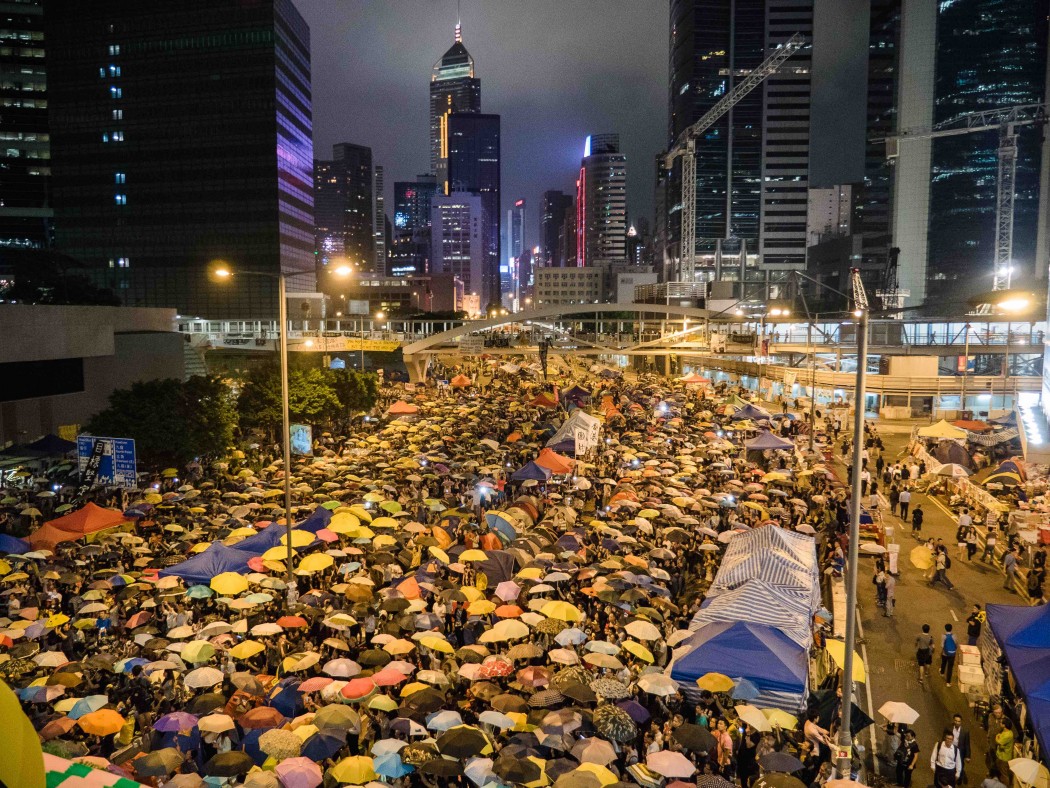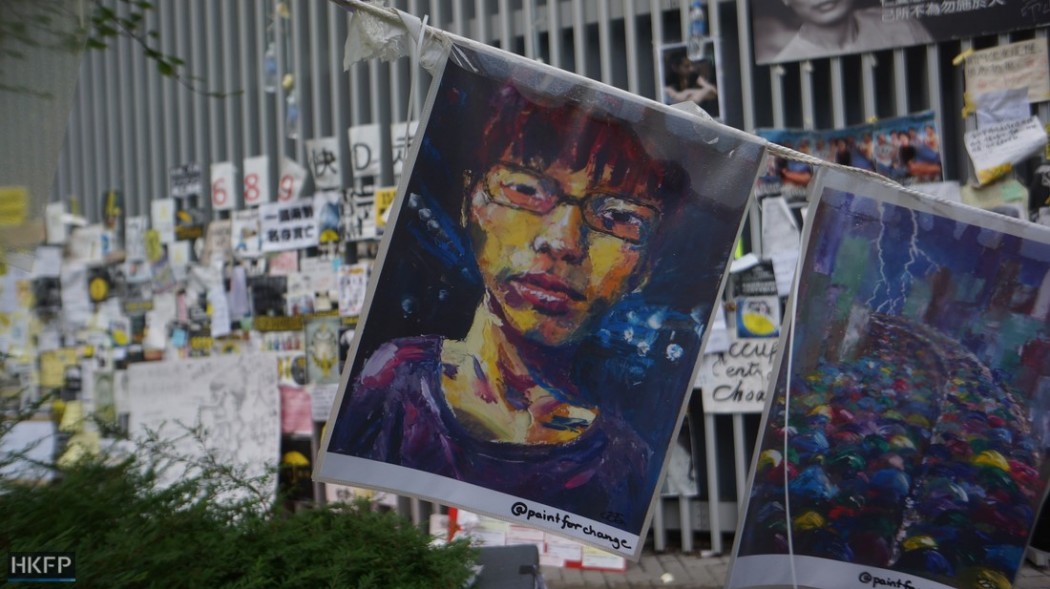By Sebastian Veg
One year after the start of the Umbrella Movement, the political situation in Hong Kong remains opaque. The movement’s greatest achievement, in retrospect, was ensuring that the government proposal to elect the Chief Executive by popular vote (among a list of candidates selected by pro-Beijing loyalists) was voted down by LegCo.
Although the SAR government tried to present the proposal as fulfilling its obligation to implement Universal Suffrage under the Basic Law, it failed to win the support of a majority of public opinion. The movement’s main limitation, by contrast, has been its difficulty in sustaining the democratic enthusiasm of the younger generation. Newly registered voters for the November 2015 District Council elections are overwhelmingly retirees (two thirds of newly registered voters are over 56) and many young people between the ages of 18 and 30 remain unregistered. This is a very serious challenge, more so than the lack of broader support for the occupation itself, and indicates the lingering sway of disenfranchisement even among Hong Kong’s younger population.

In some ways, Hong Kong’s political system functions on the basis of an equilibrium between the two main political forces. The pro-Beijing camp is prevented from rolling back fundamental freedoms by the mass street protests that have developed since 2003, while the pro-democracy camp is prevented from advancing the further democratization of the territory by Beijing’s direct intervention, mainly in the form of interpretations of the Basic Law. To an extent, the stalemate reached between the August 31 decision by the NPC and the 79-day Occupy movement has simply reestablished the status quo.
In the aftermath of the movement, the SAR government remains unrepentant, with the Department of Justice determined to prosecute the main participants despite its slim chances of success, after gathering evidence for up to a year, in convincing judges that any of the acts were “illegal”. At the same time, police violence captured on widely available videos has gone unpunished.
Despite growing criticism of the Chief Executive in the pro-establishment camp, he has apparently succeeded in convincing the Beijing authorities that he can “vote out” the pan-democrats in the 2016 LegCo elections, breaking their veto power, and thus ensuring the political reform package can still be passed as is. There will be no attempt to find a compromise before the 2016 elections. Recent interventions by Beijing’s representatives in Hong Kong have reaffirmed the conclusions of the White Paper: Beijing’s jurisdiction over Hong Kong is substantial and should embrace both the filibustering legislature and the highly internationalised judiciary.

The government also remains determined to prove a connection between the movement and “foreign forces”, an accusation made by the Chief Executive on the record in 2014, though the proof he promised to provide has yet to be submitted. This probably explains the ongoing attempt to smear and remove sympathizers of the movement in Hong Kong academia. The unprecedented vote by the HKU Council to reject Johannes Chan’s appointment as a pro-vice-Chancellor is a clear victory for the China Liaison Office, which has coordinated both the public smear campaign and the behind-the-scenes lobbying. More generally, Beijing and the SAR government both continue to promote the notion that public opinion in Hong Kong needs to adapt to the arbitrary views of an unelected government in Beijing, rather than the other way around, giving rise to continuous lecturing.
On the other hand, pro-democracy activists remain determined to achieve universal suffrage (in the commonly accepted meaning of the word), and have recently proposed amending the Basic Law and launching a constitutional referendum movement, since Hongkongers have at no time in history been consulted on the status and political system of their city. The younger generation has manifested a completely different set of values and priorities from their elders.
Post-materialist aspirations and disinterest in patriotism can be connected with a different experience of the Chinese state: while older generations saw an improving China after the Cultural Revolution, the “post-90s” have only experienced an increasingly authoritarian and jingoistic PRC government. A KMT-style patriotism – related to an abstract “China” that did not endorse the CCP’s leading role – was widespread among the baby-boomer generation. This is implicitly acknowledged by the fact that Hong Kong officials do not take an oath to the Chinese constitution, but to the Basic Law, which contains no reference to the Party. But this has been increasingly criticized as insufficiently “patriotic” by Beijing officials. Younger generations have reacted by rejecting the notion of patriotism altogether, or by advocating a Habermasian notion of “constitutional patriotism” implicit in Joshua Wong’s recent constitutional referendum proposal.

It would no doubt have been possible to find a political compromise within the framework of the NPC decision. Pledging to eliminate functional constituencies in LegCo, broadening the franchise of the nomination committee, or introducing a “double-veto” nomination system whereby a blocked list of candidates would have required approval from both sides of the political spectrum (proposed by Albert Chen) are all solutions that would have enjoyed wide popular support. The fact that they were unequivocally dismissed by the government demonstrates that Beijing operates both inside and outside the legal framework. In this approach, the legal framework is simply a convenient packaging that reflects Beijing’s understanding of the balance of power at a given point in time. True to this logic, Beijing opposes the development of political parties in Hong Kong, but the Liaison Office openly organizes fund-raisers for the main pro-Beijing party and devotes considerable resources to campaigning for it.
In the new situation, Beijing has reaffirmed its prerogative to pick out members of the pro-democracy camp it deems “patriotic” for discussions. Pro-Beijing newspapers have carried out an ongoing smear campaign against the Law Faculty at the University of Hong Kong, which it sees a stronghold of the Umbrella Movement. Beijing supports the autonomy of the SAR government but at the same time has built up a vast and powerful network of parallel governance in the Liaison Office, which not only operates covertly, but also appears publicly to negotiate political deals. After LegCo voted down the reform package, pro-establishment legislators rushed to the Liaison Office to receive a midnight sermon and engage in self-criticism. The Liaison Office, rather than the Chief Executive, is undoubtedly the “transcendent” element in Hong Kong politics.
Nonetheless, Beijing still supports introducing some form of popular franchise, both to fulfill the letter (if not the spirit) of article 45 of the Basic Law, and to enhance the political legitimacy of the Chief Executive and improve governance in the city. As long as the Centre has the political ability to package popular confirmation of its selected candidate as universal suffrage, there is no reason not to do so. If the LegCo elections prove this strategy to be misguided, there is always time to backtrack.

This underscores the crucial significance of the 2016 elections. It also suggests that universal suffrage will only be introduced if and when its benefits outweigh its drawbacks in Beijing’s risk calculation. The District Councils, in which non-elected seats are finally due to be completely phased out this year, are an example of “successful” democratization in Beijing’s eyes, made possible by the collapse of the pro-democracy camp, outspent and pushed into irrelevance in the districts over the last 15 years. While they held a majority of the elected seats at the time of the handover (then a minority of seats), now that all seats will be elected, pro-democracy members may only control about one quarter.
Nonetheless, the district councils have paradoxically become Hong Kong’s most democratic institution. If the pro-democracy camp wants to achieve bottom-up change, it cannot afford to neglect them. All sides have deplored the “politicization” of Hong Kong in the aftermath of the Umbrella Movement. It seems this politicization mainly reflects the SAR government’s will to fully exercise it prerogatives rather than encouraging bipartisanship. However, in the longer perspective, it is still the disenfranchisement and depoliticization of Hong Kong’s postcolonial population that remain the greatest challenge for the pro-democracy movement.
